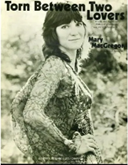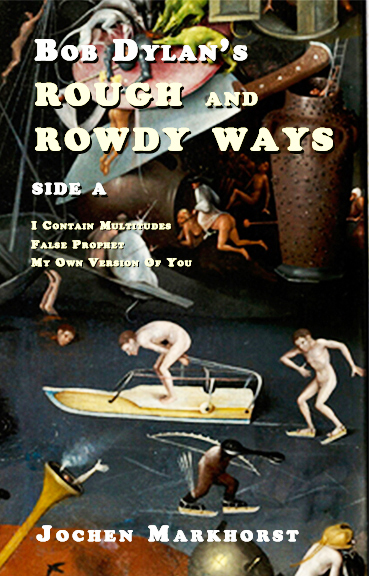by Jochen Markhorst
II Torn Between Two Lovers
I got this graveyard woman, you know she keeps my kids
But my soulful mama, you know she keeps me hid
She's a junkyard angel and she always gives me bread
Well, if I go down dyin', you know she's bound
to put a blanket on my bed
 In the Wind, the third album by Peter, Paul and Mary, is the record that effectively marks Dylan’s breakthrough as a songwriter. It features three songs by the then unknown Bob Dylan (“Don’t Think Twice, It’s All Right”, “Quit Your Low Down Ways” and “Blowin’ in the Wind”).
In the Wind, the third album by Peter, Paul and Mary, is the record that effectively marks Dylan’s breakthrough as a songwriter. It features three songs by the then unknown Bob Dylan (“Don’t Think Twice, It’s All Right”, “Quit Your Low Down Ways” and “Blowin’ in the Wind”).
Blowin’ is the lead-off single, released three months before the release of the LP in October 1963, and becomes a huge hit. More than a million copies sold – Dylan’s name is established, his wallet filled. The next single, Don’t Think Twice, fares nearly as well and reinforces Dylan’s name and credit score.
The trio also wrote their own songs, the most successful of which was Peter Yarrow’s “Puff, the Magic Dragon” (with lyrics by Lenny Lipton), but their success remained mainly dependent on others. Bob Dylan, old folk songs, Pete Seeger, Gordon Lightfoot… and John Denver’s “Leaving On A Jet Plane” is their last and biggest hit (1969, their only number one hit in Billboard’s Hot 100, after five Top 10 hits in previous years).
Ironically, Peter Yarrow’s greatest success as a songwriter, like Dylan’s, came when someone else scored a number one hit with one of his songs: in February 1977, Mary MacGregor reached the top spot with Yarrow’s “Torn Between Two Lovers”. She then reached the Top 100 twice more with Peter Yarrow songs, “This Girl (Has Turned into a Woman)” and “For a While”, all of which inspired music critic Robert Christgau to make the witty, somewhat vicious observation: “I consider it significant that Peter Yarrow’s first commercial success of the decade is an Olivia Newton-John substitute, albeit one who’s willing to admit she fucks around” (Christgau’s Record Guide: Rock Albums of the Seventies, 1979).
Witty, and not entirely untrue, but still disparaging: the songs are not that vulgar. “Torn Between Two Lovers” is an adultery song that is archetypal for the female half of the genre. At least, until the Third Feminist Wave, until the Girl Power generation, something regretful, something apologetic, something vulnerable usually prevails among the ladies. “Torn between two lovers, feeling like a fool,” Mary sings in the chorus, “Loving both of you is breaking all the rules.” And in the verses, she tries to ease the pain of her lawful husband with heartbreaking regret. She still loves him very much, but she just has this empty place inside of me that only he can fill. And truly, no one else can have the part of me I gave to you – and more of those soothing, comforting, loving incantations. Or like Marlene Dietrich’s evergreen “Ich weiß nicht, zu wem ich gehöre” (I don’t know to whom I belong, 1947);
Ich weiß nicht zu wem ich gehöre Ich bin doch zu schade für einen allein. Wenn ich jetzt grad hier Treue schwöre Wird wieder ein anderer ganz unglücklich sein. I don't know to whom I belong I'm too good for just one person. If I swear my loyalty right now Someone else will be very unhappy.
… a bit more assertive, but still with that apologetic undertone.
Among the male colleagues, the tone is generally radically different. Men who sing about their own adultery usually do so unashamedly, rarely tormented, and usually boastful, as Willie Dixon said about Muddy Waters. Macho, cocky pride dominates, in any case. “Back Door Man”, “Me And Mrs. Jones”, “Travelling Riverside Blues”. “Breaking Up Somebody’s Home”… men like Howlin’ Wolf and Robert Johnson are neither vulnerable nor apologetic. Or like the narrator in the song on which “From A Buick 6” is loosely based, on Sleepy John Estes’ “Milk Cow Blues” from 1930.
Sleepy John Estes is a giant who appears in Dylan’s life and work as regularly as the mile markers along Highway 61. Dylan mentions him in the opening line of the liner notes on Bringing It All Back Home (1965; I’m standing there watching the parade/ feeling combination of Sleepy John Estes. Jayne Mansfield. Humphrey Bogart), attends his performances in Greenwich Village in the early 1960s, continues to refer to Estes in interviews, plays and copies his songs (most flagrantly in 2006, in “Someday Baby”, Dylan’s adaptation of Sleepy John’s “Someday Baby Blues” from 1935). Around his 1990s return to his roots, World Gone Wrong (1993), the album on which he greets Sleepy John Estes with “Ragged & Dirty”, Dylan poetically expresses his admiration and indebtedness:
“People like Son House, Reverend Gary Davis or Sleepy John Estes. Just to sit there and be up close and watch them play, you could study what they were doing, plus a bit of their lives rubbed off on you. Those vibes will carry into you forever, really, so it’s like those people, they’re still here to me. They’re not ghosts of the past or anything, they’re continually here.”
(Gary Hill interview, Oct. 1993)
Despite all his love and poetic admiration, DJ Dylan never plays a record by Sleepy John Estes on his radio show Theme Time Radio Hour (2006-09), not even in episode 28, “Sleep”. Indirectly, however, he does sometimes sneak him in. In the afterword to “Lucy Mae Blues”, for example:
“That was Frankie Lee Sims. He was Lightnin’ Hopkins’ cousin, born in New Orleans, died in Dallas. And recorded that song, which is kind of a mash-up between a couple of blues standards. You hear a little bit of “Ain’t No Tellin’”, which Mississippi John Hurt made famous, and a little tast of “My Sunday Woman”, or as some people call it: “Every Day In The Week”. I like the version by Sleepy John Estes.”
(Theme Time Radio Hour Ep. 53: Days of the Week, 3 Oct. 2007)
… there are no Sleepy John Estes recordings of any of the songs mentioned.
Back to 1965. Six weeks after 16 June, the day on which the final version of the landmark “Like A Rolling Stone” was recorded, Dylan is back in the studio to record the rest of Highway 61 Revisited. On 29 July, he transforms the sharp, fierce rocker “Phantom Engineer” into the melancholic masterpiece “It Takes A Lot To Laugh, It Takes A Train To Cry”, records the hallucinatory “Tombstone Blues” in between, and ends the day with the stunning “Positively 4th Street”. Dylan and his mates, led by Kooper and Bloomfield, are in stratospheric, mercurial top form.
The following day, Friday 30 July 1965, begins with a warm-up that proves to have lasting power: “From A Buick 6” (at the time still called “Lunatic Princess No. 3”). First, two short, interrupted takes. The first breaks off after 23 seconds, when Dylan uses a plural: “I’ve got these graveyard women, you know they…”. On the second, we only hear producer Bob Johnston’s announcement and Dylan saying, “I’ll start off with the harmonica.” Then there are only two complete takes, and that’s it. Take 3 does not seem to exist, and Take 4 and Take 5 are interchangeable (quite literally: Take 4 is used on the first American pressings and all Japanese pressings, Take 5 on all others).
And in all takes, we hear that today Sleepy John Estes’ “Milk Cow Blues” is haunting Dylan’s creativity, and a man who is torn between two lovers, “one who’s willing to admit he fucks around”…
————
To be continued. Next up From A Buick 6 part 3: I will die in thy lap
Jochen is a regular reviewer of Dylan’s work on Untold. His books, in English, Dutch and German, are available via Amazon both in paperback and on Kindle: 
- Blood on the Tracks: Dylan’s Masterpiece in Blue
- Blonde On Blonde: Bob Dylan’s mercurial masterpiece
- Where Are You Tonight? Bob Dylan’s hushed-up classic from 1978
- Desolation Row: Bob Dylan’s poetic letter from 1965
- Basement Tapes: Bob Dylan’s Summer of 1967
- Mississippi: Bob Dylan’s midlife masterpiece
- Bob Dylan’s Greatest Hits
- John Wesley Harding: Bob Dylan meets Kafka in Nashville
- Tombstone Blues b/w Jet Pilot: Dylan’s lookin’ for the fuse
- Street-Legal: Bob Dylan’s unpolished gem from 1978
- Bringing It All Back Home: Bob Dylan’s 2nd Big Bang
- Time Out Of Mind: The Rising of an Old Master
- Crossing The Rubicon: Dylan’s latter-day classic
- Nashville Skyline: Bob Dylan’s other type of music
- Nick Drake’s River Man: A very British Masterpiece
- I Contain Multitudes: Bob Dylan’s Account of the Long Strange Trip
- Bob Dylan’s Rough And Rowdy Ways – Side B
- Bob Dylan’s High Water (for Charley Patton)
- Bob Dylan’s 1971
- Like A Rolling Stone b/w Gates Of Eden: Bob Dylan kicks open the door
- It Takes A Lot To Laugh, It Takes A Train To Cry b/w Just Like Tom Thumb’s Blues – Bob Dylan’s melancholy blues
- Bob Dylan’s Rough And Rowdy Ways – Side A
